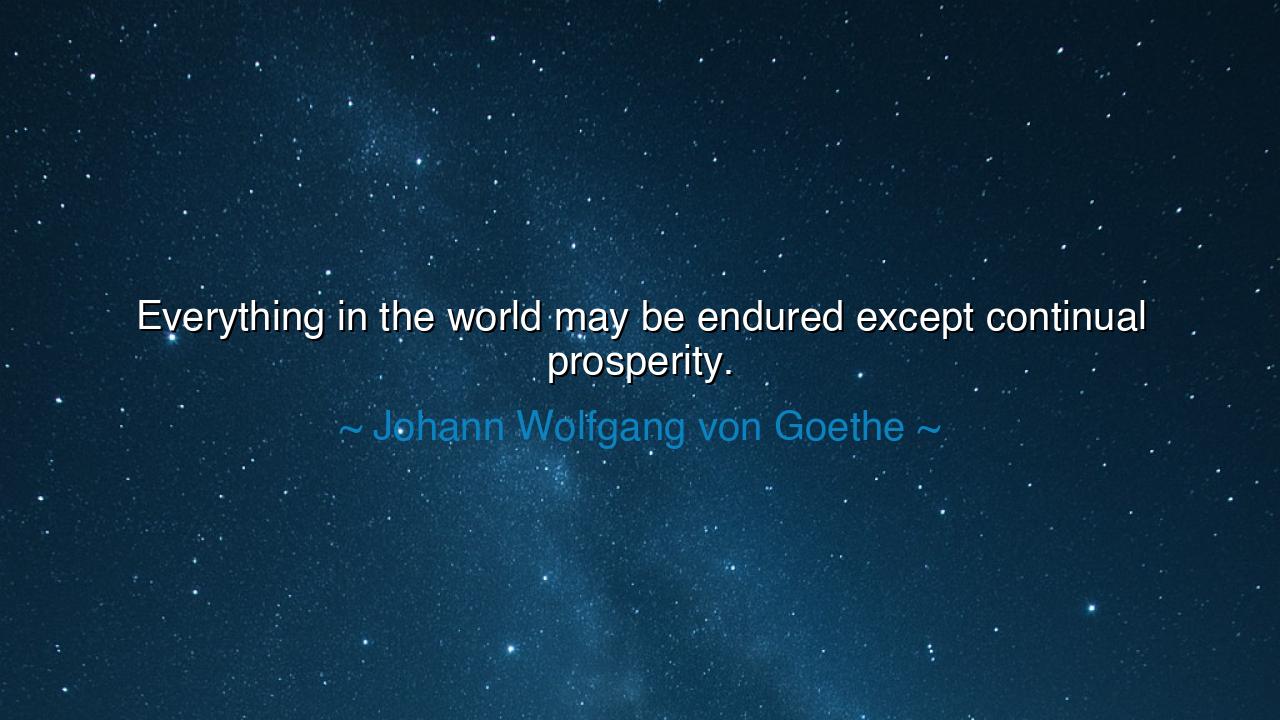
Everything in the world may be endured except continual






Johann Wolfgang von Goethe, sage of the German soul, gave us this piercing insight: “Everything in the world may be endured except continual prosperity.” In these words, he unmasks a paradox of human life—that hardship, though bitter, strengthens us, while endless prosperity weakens the soul. Man can survive famine, war, and loss with courage, but when comfort and fortune never cease, he grows soft, restless, and corrupt. For the fire that tempers steel is struggle; without it, the spirit bends and breaks under the weight of ease.
The heart of this wisdom lies in the nature of endurance. Adversity summons forth resilience, teaching men patience, courage, and ingenuity. But continual prosperity numbs these virtues, leaving only vanity, complacency, and greed. Goethe reminds us that man was not fashioned to live forever in pleasure, but to grow through trial. When the soul faces no resistance, it weakens; when it wrestles with hardship, it awakens.
History confirms this truth. Consider the fall of Rome. In her early years, Rome was forged in struggle—farmers turned soldiers, citizens enduring hardship, building with discipline. But as her prosperity grew unending, luxury replaced virtue. Gladiatorial games and indulgence consumed the people, and the empire, once iron, crumbled into dust. The Romans endured famine and war, but they could not endure the poison of continual wealth.
So too in the age of monarchs. The court of Louis XVI glittered with jewels and feasts while peasants starved in the fields. The nobility, softened by prosperity, lost their sense of duty and reality. When the Revolution came, their wealth could not save them, for their continual indulgence had already doomed them. Their downfall was not caused by one famine, but by generations untested by hardship.
O children of tomorrow, learn from Goethe’s wisdom: do not crave a life of endless ease, for it is not a blessing but a danger. Embrace the seasons of trial, for they give strength; welcome the moments of want, for they give wisdom. Continual prosperity breeds decay, but the rhythm of struggle and triumph gives life its nobility. Remember always: the soul grows not in gardens of endless summer, but in the storms and winters that call forth its hidden strength.






LHPham Lien Huong
Goethe's quote makes me question whether we as a society have become obsessed with perpetual success. Could our constant strive for prosperity be detrimental in the long run? Perhaps what we truly need isn’t endless prosperity, but rather a sense of purpose or a meaningful journey. Wouldn’t people become more resilient and appreciative of their blessings if they had to face some challenges along the way?
TDTa Tien Dat
This quote resonates with the idea that happiness isn’t necessarily tied to material wealth or unending success. It seems that after a certain point, constant prosperity might create a sense of stagnation or even dissatisfaction. But how much prosperity is too much? Could it be that we’re meant to experience a balance between highs and lows in life for emotional growth? Or does this idea underestimate the joy and freedom that consistent prosperity can bring?
NTMinh Tam Nguyen Thi
I’m not sure I fully agree with this quote. Prosperity can bring comfort and security, but I wonder if the constant pursuit of it could be exhausting. Could enduring prosperity mean living in a state of never-ending pressure to maintain success, constantly fearing loss? On the other hand, would people prefer to struggle with adversity over enjoying continual prosperity? How much is enough for a person to feel content, and what does that say about human nature?
MNMai Nguyen
This quote is interesting because it suggests that prosperity, when it becomes constant, might actually be a burden. I’ve always thought that wealth or success would bring happiness, but Goethe’s perspective flips that idea on its head. Could it be that constant prosperity leads to a lack of challenges, which might make life feel empty or meaningless? How do you think people who’ve always had everything they want feel about life? Does endless success really lead to fulfillment?